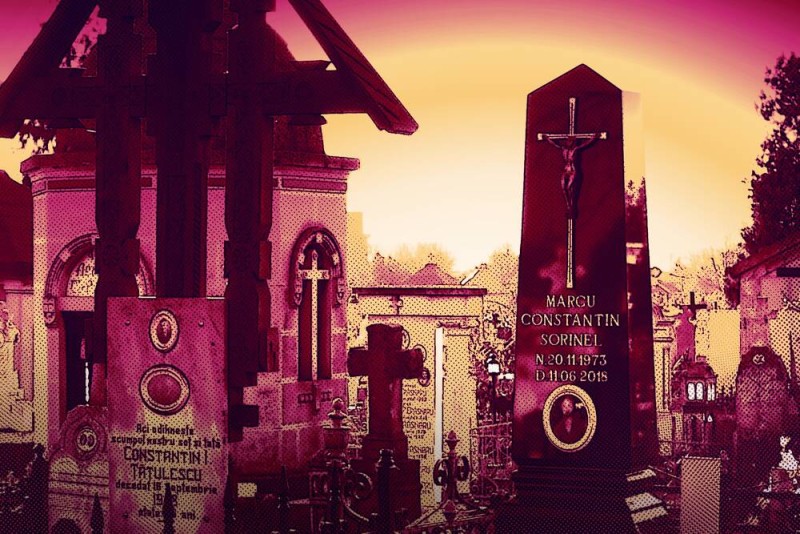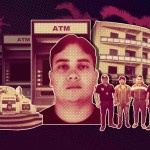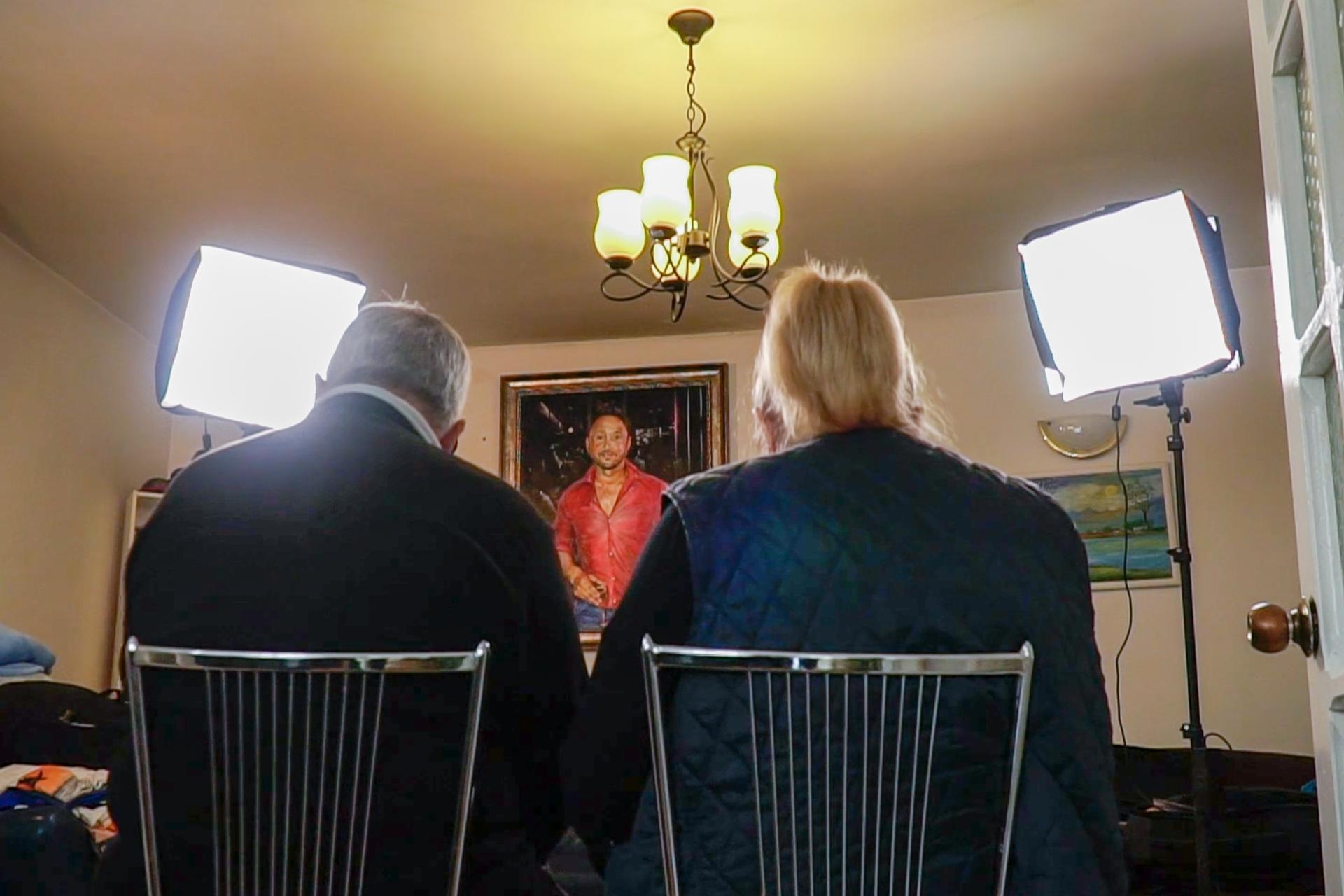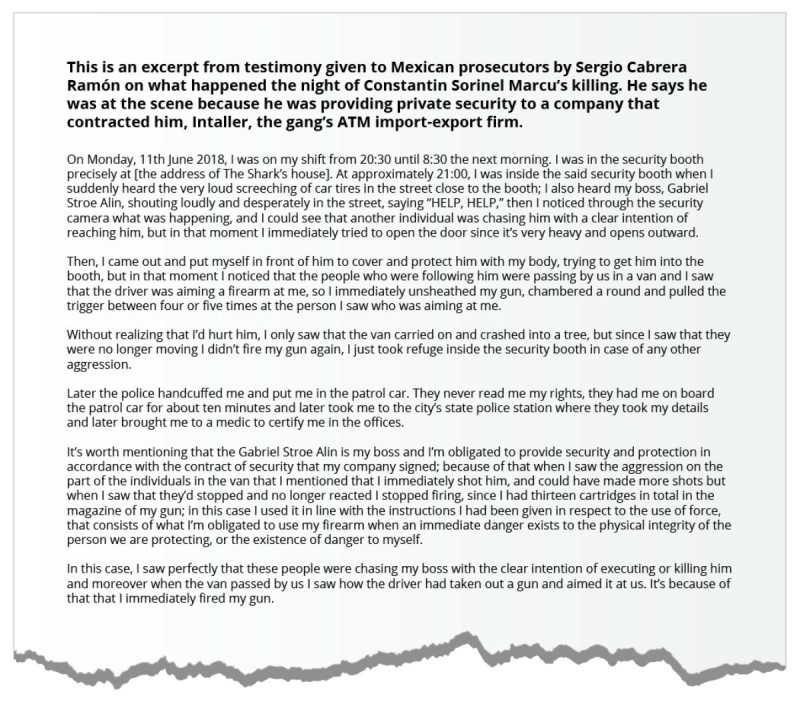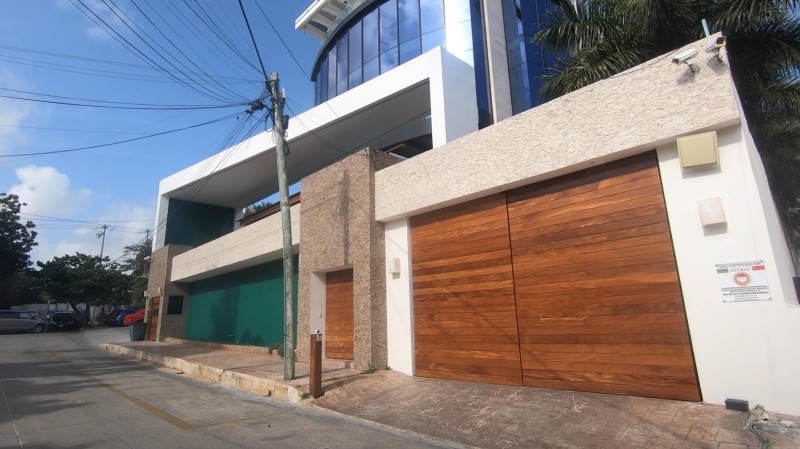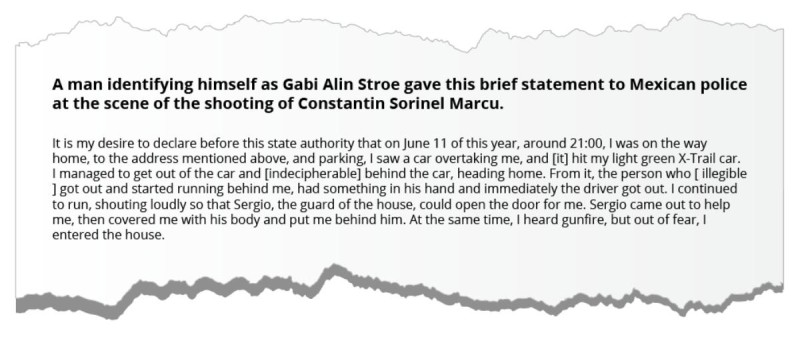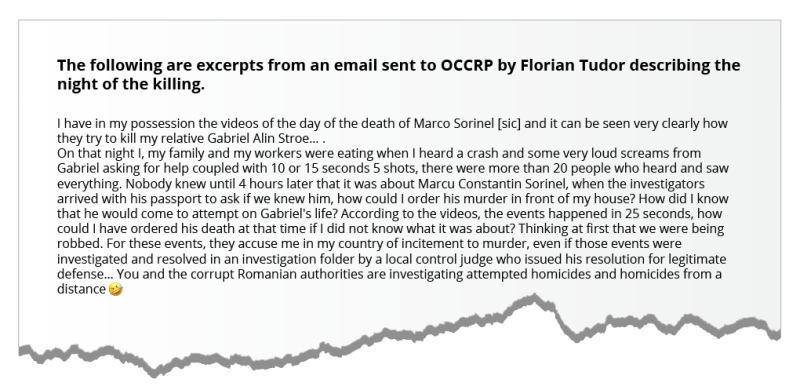Constantin Sorinel Marcu was in a tough spot. He had stabbed a man in the neck after a fight at a swimming pool, and he needed to get out of Romania, fast.
Then a good friend from his hometown of Craiova got in touch with an offer that was hard to refuse, suggesting that Marcu travel to Mexico’s Mayan Riviera, a tropical paradise where he could lie low, and earn money working as his friend’s bodyguard.
“He promised him a good life there,” Marcu’s mother, Maria, recalled.
But Marcu’s new employer wasn’t just your average hometown buddy. He was Florian Tudor, a Romanian running a lucrative racket stealing cash from unsuspecting tourists via ATM skimming. Tudor had moved to Mexico from Craiova a few years earlier, rebranding himself as “The Shark” along the way.
By agreeing to work as Tudor’s bodyguard, Marcu was thrown into the inner circles of his globe-spanning organized crime group, which by one estimate was raking in US$240 million a year.
Things went well for a while — Marcu was so close to Tudor that he even offered to kill for him — but the friendship soured about a year into their Mexican partnership. A gang member said Tudor grew jealous of Marcu’s success with women, and they also began to argue about money.
Marcu began to sabotage the Shark’s skimming operation, writing on tiny slips of paper he’d tape to ATMs around Cancún: “Don’t insert your card because you will find yourself without money.” He smeared superglue on some of the card readers.
His parents believe he even became an FBI informant, spilling the beans about how Tudor was committing ATM fraud across Mexico.
The Shark didn’t take any of this lying down.
Marcu’s parents, back in their cramped house on the outskirts of Craiova, received a terrifying visit from two men, including a muscular, heavily tattooed man named Sorin Velcu, known as the gang’s enforcer.
He dashed a bottle of water in the face of Marcu’s father, Constantin, and let loose with a stream of profanities and threats.
“We will send him to you in a box,” he hissed.
“We’ll kill him and you too!”
Murder on the Riviera
On the other side of the world, their son was also receiving threats.
Marcu had stayed in Mexico’s Riviera Maya region under a false identity after his falling out with The Shark.
“He would call Sorin and threaten him on the phone,” recounted his father. “‘Sorin, I’m going to kill you,’ he’d say. He was angry that Sorin wasn’t there to protect him anymore, and moreover, that he’d betrayed him by putting those warnings on ATMs.”
Despite being sworn enemies, Marcu and The Shark stayed in regular contact via WhatsApp, where they would sometimes trade threats. Romanian police files reveal that in one exchange, Tudor directly threatened Marcu’s life:
In April 2018, the simmering tensions came to a head. Three men associated with The Shark’s gang viciously attacked Marcu as he left a DHL office in Cancún. One of them, Gabi-Alin Poenaru, known as “Patrian,” was a senior member of the gang.
A History of Violence
Gabi-Alin Poenaru, 41, is also known by the alias “Patrian.” Like most of the gang’s senior figures, he hails from Craiova, a city in southern Romania, where he racked up a criminal history before hopping the ocean to Mexico.
They stabbed him repeatedly and beat him unconscious, but he survived. He woke up in a Cancún hospital, where doctors had to remove his spleen.
Afterwards, Marcu was hot for revenge.
“I’ll kill them, I swear on my girl’s life,” he told a friend in a WhatsApp voice message. “I never swore before on my girl, but I’ll kill them.”
Weeks later, while he was still recovering, he was shot in the back of the head with a 9mm Beretta pistol.
Shortly afterwards, the phone rang in his parents’ Craiova home. On the other end of the line was a man who sounded drunk and barely coherent. He told them their son was dead.
Maria Marcu was in her kitchen. She swooned with grief.
“I fell to the floor. I died. I came back to life. You can’t imagine what it was like.”
“That day was something terrible for us,” adds Constantin. “The pain is excruciating.”
After a Death, Confusion
Constantin Sorinel Marcu died on the evening of June 11, 2018, at the age of 44.
He was found by police slumped in the driver’s seat of a Dodge Nitro SUV just down the street from Florian Tudor’s imposing multi-story mansion in an upscale neighborhood of Cancún. The house, where Tudor lived with his wife and young son, had also been serving as the Riviera Maya gang’s headquarters.
But although these facts are well-established, almost nothing else about Marcu’s death is clear.
The narratives for how Marcu came to be found with a bullet in his head diverge at this point. A Mexican judge endorsed one, while a Romanian investigation looked at a competing scenario.
Daniel-Zoltan Piculeață, a Romanian friend of Marcu’s who had flown to Mexico to be with him after the stabbing, claims to have witnessed his death. His was the drunken voice that Marcu’s parents heard on the other end of the line, telling them their son was dead.
He alleges that “Patrian,” along with a Mexican man in a camouflage shirt, discharged their weapons into Marcu outside a canteen serving Romanian food.
Although Piculeață has given differing versions of the events to Marcu’s parents and Mexican and Romanian authorities, he has consistently said that Patrian and the “man in camouflage” shot his friend.
Piculeață’s statements do not make it clear where in Cancún Marcu was shot, or how his body came to be found so close to The Shark's house. But he told Mexican authorities that Marcu believed Florian Tudor wanted him and his family dead.
The Official Story
The official story accepted by local police and a Mexican judge is different, and places the blame squarely on Marcu for his own death.
A private security guard told police at the scene of the crime that he shot and killed Marcu. Hours later, in an official statement given at the Cancún police department, explained that he did that because Marcu tried to murder his boss, a man he named as Gabriel Stroe Alin.
However, when police tested Cabrera’s hands and forearms for sodium rhodizonate, a lead residue left behind when a firearm is discharged, the results came back negative.
Nonetheless, his account was accepted by a local judge at a court hearing three days after the killing. The key evidence backing his claim was CCTV footage taken from a camera mounted on The Shark’s house.
The footage shows a man parking his car outside a house in an upscale neighborhood. As he gets out, another vehicle rounds a corner and tries to ram him.
The first man escapes on foot, but a passenger in the other car gets out and chases him. Eventually the pursuer gives up and gets back into his car, and the two attackers drive off.
A few minutes later and just meters down the road, Marcu was found dead in this same car.
Judge Shelling Kierkegard Novelo Yeh accepted this footage as evidence and, after a two-and-a-half-hour trial, ruled that the security guard had killed Marcu lawfully, in defense of his employer.
(Judge Novelo Yeh is currently suspended from duty pending investigations into irregularities in another case, in which he released two alleged kidnappers. During the investigation, it was discovered that the judge owned tens of thousands of dollars in undeclared properties.)
A man who identified himself as Cabrera’s employer, “Gabi Alin Stroe,” also gave police a statement at the scene, but told officers he did not have any formal identification documents. His current whereabouts are unclear.
Gabi Alin Stroe – also sometimes known as Alin Gabriel Stroe – and Gabi-Alin Poenaru are two different members of the Maya Riviera gang. But at times Poenaru has assumed Stroe’s identity, Romanian prosecutors say.
Police reported three bullet casings with “Aguila 380 Auto” marked on them.
Two days later, according to police records seen by OCCRP, they searched Florian “The Shark” Tudor’s home. Inside, they found seven cartridges of the same brand and model of bullets.
OCCRP reached out to Florian Tudor to ask him what happened on the night of the murder.
In an email, he said he was at home eating dinner with his family and staff when he heard a crash and loud screams from Gabriel Alin Stroe, whom he identified as a relative. Then, he said, he heard shots ring out in the night. Four hours later, officers arrived at his house with a copy of Constantin Sorinel Marcu’s passport and asked if he knew the man.
Tudor emphasized that the CCTV footage from cameras mounted in his compound shown in court, and leaked to local media in the aftermath of Marcu’s death, supported his version of events.
Mexican officials have never publicly discussed the investigation, and the Quintana Roo state prosecutor’s office closed the case after the judge’s ruling.
But unlike Mexican authorities, Romanian police were not satisfied with the official story. Digging into the case, they found evidence that implicated Tudor’s gang in the killing.
In July 2018, Romanian prosecutors opened a case file on Tudor’s organized crime group. One year later, they issued arrest warrants for five gang members, including Gabi-Alin Poenaru.
Three of these men, including Poenaru, are now in jail, awaiting trial for attempted murder. Another two suspects are under house arrest.
On January 14 this year, Romanian prosecutors officially charged Tudor with setting up an organized crime group, although the case has still not been sent to trial. Evidence attached to the case file and testimonies collected by prosecutors bolster the case that the gang may have been behind the killing.
Marcu’s parents are formally attached to the case as witnesses to extortion, and told prosecutors what they knew of their son’s killing. They and their lawyer argue that the official story given to Mexican police was made up to deflect blame from their son’s true killers — the Riviera Maya gang.
They also point to other issues with the official story. For example, a photograph of Marcu dead in the vehicle shows him barefoot, which would be unusual for someone staging a kidnapping.
‘We think this was all staged by them,’ said Constantin Marcu. “Our feeling, as his parents, tells us that he was killed somewhere else and then brought here.”
The elderly couple still dotes on their son — “my boy,” his father calls him — even in death.
In their living room, a large oil painting of Marcu, hair slicked back in his signature pompadour, now graces the walls. Before falling into a life of crime he had been a promising young man who played football for a famous junior team in Bucharest.
“My boy was big, strong, and intelligent,” said his father.
They visit his grave in a Craiova cemetery every day to light candles and pray. Nevertheless, they fear his soul will never find peace if his killers are not brought to justice.
“This Shark, who runs freely and who nobody seems to be able to trap, finished my boy,” lamented Constantin Marcu.
